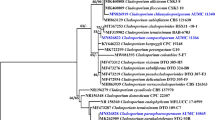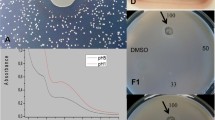Abstract
THE ability of certain members of the genus Pseudomonas to cause a soft rot of plant tissue or to degrade pectin preparations has been known for some time1. It is surprising that this character of the pseudomonads has not been given more attention, considering the Very common occurrence of members of this genus in Nature and the economic importance of soft rots in plant tissue.
This is a preview of subscription content, access via your institution
Access options
Subscribe to this journal
Receive 51 print issues and online access
$199.00 per year
only $3.90 per issue
Buy this article
- Purchase on Springer Link
- Instant access to full article PDF
Prices may be subject to local taxes which are calculated during checkout
Similar content being viewed by others
References
Dowson, W. J., Trans. Brit. Mycol. Soc., 25, 215 (1941). Oxford, A. E., Nature, 154, 271 (1944).
Dowson, W. J., “Plant Diseases due to Bacteria”, 99 (Cambridge Univ. Press, 1957).
Wieringa, K. T., Fourth Internat. Cong. Microbiol., Copenhagen, Abst., 482 (1947).
Author information
Authors and Affiliations
Rights and permissions
About this article
Cite this article
PATON, A. Pectin-decomposing Strains of Pseudomonas. Nature 181, 61–62 (1958). https://doi.org/10.1038/181061b0
Issue Date:
DOI: https://doi.org/10.1038/181061b0
This article is cited by
-
A Selective Medium for the Isolation of Soft Rot Coliforms from Soil
Nature (1963)
-
Biochemische und mikrobiologische Probleme der Stadtmüll-Kompostierung
Schweizerische Zeitschrift für Hydrologie (1960)
Comments
By submitting a comment you agree to abide by our Terms and Community Guidelines. If you find something abusive or that does not comply with our terms or guidelines please flag it as inappropriate.



